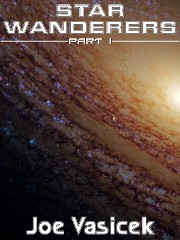
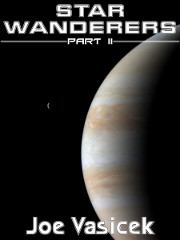
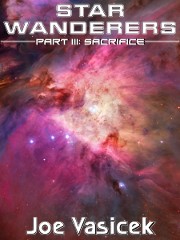
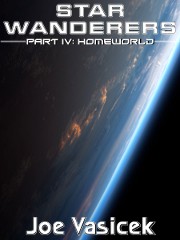
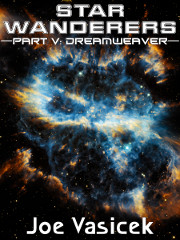
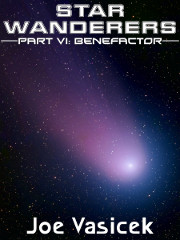
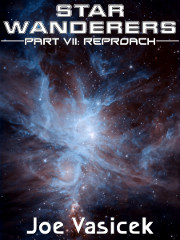
When I published the first couple installments of Star Wanderers, it represented both an experiment with a new publishing format and a departure from the more long-form styles that I was used to. Now, a little over a year later, I can say it’s been a success. The series isn’t finished, and I’m still learning as I go, but here are some of the big lessons that I’ve picked up:
Novellas are surprisingly well-suited to series. They read fairly quickly, contain enough focus to sustain an episode of a larger story, and yet at the same time contain enough space to develop a wider arc. Plus, they are a lot quicker to write than novels and generally don’t require as much editing, since it’s easier to get the story right on the first pass. This means that you can put out novellas faster and more regularly than long-form novels, maintaining good momentum for the series as a whole.
It’s hard to write anything shorter than a novella without leaving readers unsatisfied. By far the biggest criticism I’ve received for Outworlder (which is really more of a novelette than a novella) is that the story feels too short. If the novella (17,500 to 40,000 words, or 80 to 150 pages) has all the benefits of the novel and the short story, then it seems that the novelette (7,500 to 17,500 words, or 30 to 80 pages) has all of the drawbacks. Then again, it could just be that I have yet to master the form.
The satisfying element in a series is at least as important as the returnable element. Every successful episodic story has some sort of returnable element–something about the story that makes the audience ravenous for more. Often, this takes the form of a cliffhanger, leaving something unresolved. However, it’s not enough just to string readers along, holding back whatever your story has promised them. In every installment, you have to deliver.
It’s a delicate balance, to be sure, but the advantage of erring on the side of satisfaction is that the satisfaction can actually become a major hook in itself. If readers know that they’re going to be satisfied whenever they pick up one of your books, you don’t have to ratchet up the tension to eleven in order to keep them coming back. Several Star Wanderers reviews mention that it’s more relaxing and not as fast paced as other space opera, but sales of parts III through VI are almost 1:1.
Readers love to revisit a good story from another character’s point of view. Some of the most glowing reviews I’ve received for this series are for Dreamweaver, which is basically a parallel novella to Outworlder but from Noemi’s point of view. In Outworlder’s Amazon also-boughts, it sometimes even appears ahead of Homeworld, which actually comes before it in the series order. This tells me that readers love to revisit a story, or to hear the same story again but from a different point of view. Head-hopping from episode to episode can be a great way to add variety and depth.
Plenty of readers are willing to pay $2.99 per book for a series they enjoy. When I published the omnibus for Star Wanderers I-IV, I wondered if sales of the individual novellas would taper off since I priced the omnibus much lower than their sum. To my surprise, sales for both the omnibus and the individual installments have actually remained about even. Since the omnibus clearly shows up on Amazon’s recommendations, this tells me that $2.99 is not too high of a price, even for a novella.
Perma-free works; however, free and $.99 attract some bad apples. Do not underestimate the power of free, especially perma-free for the first book in a series. I credit that strategy for at least 90% of the Star Wanderers sales, since the series itself has boosted my total sales numbers by more than an order of magnitude. However, there are people out there who never fail to find something to complain about. These are usually the same people who don’t like to pay for anything, and when they realize that the rest of my series is not free, they tend to leave unhelpful and/or incomprehensible reviews.
I priced Fidelity at $.99 to try to give readers more of a hook from part I to part II, but the sales ratio between part II (Fidelity) and part III is about 2.5:1–in other words, pretty bad. Judging from some of the reviews, it seems that a fair number of the people who are dropping out are the bad apples. I haven’t decided whether to raise the price, but if things keep going the way they have been, I probably will.
Series don’t usually take off until the third or fourth installment. Do you know how many sales Outworlder had in the month when I first published it? About 10–and that was actually a surprise. When I published Fidelity, I had even fewer, and Sacrifice hardly sold anything until Outworlder went perma-free. When it did, sales of the other two novellas picked up, but it wasn’t until after I’d published Dreamweaver that the sales of Fidelity started hitting triple digits. The lesson to me is clear: it takes time for a series to pick up steam, so don’t be like Fox. Give it a chance to grow.
Nothing sells a book like writing and publishing more books. This is probably the main driving factor behind the last point. I’ve done almost no promotion for Star Wanderers, other than putting out new books on a fairly consistent basis. Amazon’s algorithms have probably done their part (sales on other outlets haven’t been growing nearly as much), but at the end of the day, there is no substitute to writing more and better books. Any sort of promotional or marketing activity that takes away from my writing time is just not worth it–not when I’ve got stories to tell.
Right now, I’m getting ready to start a new spin-off series, which hopefully will be even more successful. I’ll to try out a few new things (mostly along the lines of better covers and meatier novellas), but mostly, I’m going to try to replicate the success I’ve achieved with Star Wanderers by keeping these lessons in mind. I have no idea how this new series is going to go, but I figure I know enough about the publishing side now that I can focus my attention on writing an awesome story, which is the most important thing after all.